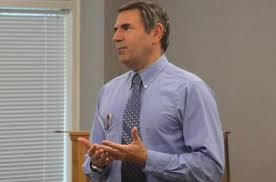‘Pausebuster’: Did NOAA’s Tom Karl Cook Climate Data?
Did a top federal government climate scientist hide data in order to refute a record of nearly two recent decades when global warming didn’t appear to occur? Did that scientist then refuse to archive the data, preventing independent analysis?
That’s the claim of John Bates, a former National Oceanic and Atmospheric Administration scientist in charge of the agency’s data integrity, who retired at the end of 2016 after a 40-year career. He made his comments recently in a whistleblowing paper. Climate scientist Judith Curry posted his paper. Britain’s Daily Mail newspaper covered it extensively.

The issue is the validity of the global warming “hiatus” or “pause” in statistically-significant warming of the planet from around 1998 to around 2015 that showed up in various records,including NOAA’s and those from NASA. Karl, also recently retired as a key NOAA executive and long-time scientific advocate of a warming climate, had the assignment of evaluating the data behind the hiatus.
Karl produced a 2015 analysis that essentially claimed the pause was bogus, never happened, and global temperatures were actually rising faster than conventional predictions during that period. As the Daily Mail reported, “Launched by NOAA with a public relations fanfare, it was splashed across the world’s media, and cited by politicians and policy makers.” The Karl report, known as the “Pausebuster” paper, became public shortly before the world gathered in Paris to agree to a comprehensive, international approach to reducing greenhouse gases.
Last week, Bates published a scathing assessment of Karl’s report, suggesting that Karl cooked the books, hurried the report, and hid the data from critical review in order to influence the Paris talks, where the outgoing Obama administration hoped to commit the U.S. and the rest of the world to increased action on global warming. The Daily Mail account noted that Karl “had a longstanding relationship with President Obama’s science advisor, John Holdren, giving him a hot line to the White House.”

Bates said the data that Karl used in his Pausebuster paper was not vetted under NOAA’s rigorous data standards reviews, was not archived and available to other researchers to challenge. Karl, said Bates, failed to disclose his data to NOAA’s review process, or that of Science magazine, or to the House Science Committee, chaired by Rep. Lamar Smith (R-Texas), a climate skeptic. “I was dumbstruck that Tom Karl…would not follow the policy of his own agency nor the guidelines in Science magazine for dataset archival and documentation,” Bates said.
Bates noted that the Karl paper used a “90% confidence threshold” for evaluating data, as opposed to a conventional 95% significance standard. He said a NOAA supervisor told him that it was “eye-opening to watch Karl work the co-authors [of the report], mostly subtly but sometimes not, pushing choices to emphasize warming. Gradually, in the months after [the study] came out, the evidence kept mountain that Tom Karl constantly had his ‘thumb on the scale’ – in the documentation, scientific choices, and release of data sets – in an effort to discredit the notion of a global warming hiatus and rush to time the publication to influence national and international deliberations on climate policy.”
When Bates went to his NOAA management with his objections to Karl’s work, he told the British newspaper, they “were overridden by his NOAA superiors in what he describes as a ‘blatant attempt to intensify the impact’” of the Pausebuster paper.
The Daily Mail said that the Pausebuster “scandal has disturbing echoes of the ‘Climategate’ affair which broke shortly before the UN climate summit in 2009, when the leak of thousands of emails between climate scientists suggested they had manipulated and hidden data. Some were British experts at the influential Climatic Research Unit at the University of East Anglia.”
Climategate ultimately led to the repudiation of U.S. researcher Michael Mann’s “hockey stick” analysis of past climate conditions, showing a large increase in global temperatures in recent years, based on tree ring analysis. Mann, then at the University of Virginia and now at Penn State, refused to make his data available for independent analysis. He’s a leading advocate of major government action to avert a warming climate, and a leader in the plans for a scientists march this spring to protest the Trump administration’s position on scientific issues.